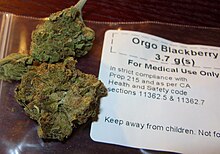Oaksterdam is a cultural district on the north end of Downtown Oakland, California, where medical cannabis is available for purchase in cafés, clubs, and patient dispensaries. Oaksterdam is located between downtown proper, the Lakeside, and the financial district. It is roughly bordered by 14th Street on the southwest, Harrison Street on the southeast, 19th Street on the northeast, and Telegraph Avenue on the northwest. The name is a portmanteau of "Oakland" and "Amsterdam," due to the Dutch city's cannabis coffee shops and the drug policy of the Netherlands.

Cannabis in Oregon is legal for both medical and recreational use. In recent decades, the U.S. state of Oregon has had a number of legislative, legal, and cultural events surrounding use of cannabis. Oregon was the first state to decriminalize the possession of small amounts of cannabis, and among the first to authorize its use for medical purposes. An attempt to recriminalize possession of small amounts of cannabis was turned down by Oregon voters in 1997.

Cannabis in California has been legal for medical use since 1996, and for recreational use since late 2016. The state of California has been at the forefront of efforts to liberalize cannabis laws in the United States, beginning in 1972 with the nation's first ballot initiative attempting to legalize cannabis. Although it was unsuccessful, California would later become the first state to legalize medical cannabis through the Compassionate Use Act of 1996, which passed with 56% voter approval. In November 2016, California voters approved the Adult Use of Marijuana Act with 57% of the vote, which legalized the recreational use of cannabis.

In Colorado, cannabis has been legal for medical use since 2000 and for recreational use since late 2012. On November 7, 2000, 54% of Colorado voters approved Amendment 20, which amended the State Constitution to allow the use of marijuana in the state for approved patients with written medical consent. Under this law, patients may possess up to 2 ounces (57 g) of medical marijuana and may cultivate no more than six marijuana plants. Patients who were caught with more than this in their possession could argue "affirmative defense of medical necessity" but were not protected under state law with the rights of those who stayed within the guidelines set forth by the state. The Colorado Amendment 64, which was passed by voters on November 6, 2012, led to recreational legalization in December 2012 and state-licensed retail sales in January 2014. The policy has led to cannabis tourism. There are two sets of policies in Colorado relating to cannabis use: those for medicinal cannabis and for recreational drug use along with a third set of rules governing hemp.
WeedMaps is a tech company serving the cannabis industry, founded in 2008 by Justin Hartfield and Keith Hoerling.

In the United States, cannabis is legal in 38 of 50 states for medical use and 24 states for recreational use. At the federal level, cannabis is classified as a Schedule I drug under the Controlled Substances Act, determined to have a high potential for abuse and no accepted medical use, prohibiting its use for any purpose. Despite this prohibition, federal law is generally not enforced against the possession, cultivation, or intrastate distribution of cannabis in states where such activity has been legalized.

Colorado Amendment 64 was a successful popular initiative ballot measure to amend the Constitution of the State of Colorado, outlining a statewide drug policy for cannabis. The measure passed on November 6, 2012, and along with a similar measure in Washington state, marked "an electoral first not only for America but for the world."

The legal history of cannabis in the United States began with state-level prohibition in the early 20th century, with the first major federal limitations occurring in 1937. Starting with Oregon in 1973, individual states began to liberalize cannabis laws through decriminalization. In 1996, California became the first state to legalize medical cannabis, sparking a trend that spread to a majority of states by 2016. In 2012, Washington and Colorado became the first states to legalize cannabis for recreational use.

Cannabis in Massachusetts is legal for medical and recreational use. It also relates to the legal and cultural events surrounding the use of cannabis. A century after becoming the first U.S. state to criminalize recreational cannabis, Massachusetts voters elected to legalize it in 2016.
Cannabis tourism in the United States is a form of drug tourism that exists in recreationally legal cannabis states. As of May 2023, 23 states, Washington, D.C., and Guam have legalized recreational cannabis.
Harborside, formerly Harborside Health Center, is a recreational and medical cannabis dispensary, with its flagship location in Oakland, California, and an additional location in San Jose. Founded in 2006 by Steve DeAngelo, Harborside operates as a non-profit patient collective. In December 2011, Harborside Health Center was featured in the Discovery Channel's four-part documentary series, Weed Wars. In June 2013 CNN premiered "Inside Man", an 8-episode documentary hosted and produced by Morgan Spurlock. The show's first episode provided a detailed, inside look at California's medical marijuana industry and featured Spurlock working in Harborside Health Center, as well as it described the legal troubles of the center.

Cannabis in Nevada became legal for recreational use on January 1, 2017, following the passage of Question 2 on the 2016 ballot with 54% of the vote. The first licensed sales of recreational cannabis began on July 1, 2017.

Cannabis is legal in Illinois for both medical and recreational use. Illinois became the eleventh state in the US to legalize recreational marijuana effective January 1, 2020.

Cannabis in New Jersey is legal for both medical use and recreational use. An amendment to the state constitution legalizing cannabis became effective on January 1, 2021, and enabling legislation and related bills were signed into law by governor Phil Murphy on February 22, 2021.

Cannabis in Washington relates to a number of legislative, legal, and cultural events surrounding the use of cannabis. On December 6, 2012, Washington became the first U.S. state to legalize recreational use of marijuana and the first to allow recreational marijuana sales, alongside Colorado. The state had previously legalized medical marijuana in 1998. Under state law, cannabis is legal for medical purposes and for any purpose by adults over 21.
Christian Hageseth is an entrepreneur, author, marijuana rights advocate and business owner. He was born in Pensacola, Florida, and grew up in Fort Collins, Colorado. He graduated from Arizona State University in 1992 with a degree in Political Science. He is the founder of Green Man Cannabis, an award-winning marijuana cultivation and dispensary business in Denver, Colorado. He is also the founder of American Cannabis Partners (ACP), a cannabis business development firm, which is developing the Colorado Cannabis Ranch. Hageseth is the author of Big Weed: An Entrepreneur's High Stakes Adventures in the Budding Legal Marijuana Business, published in 2015 by Macmillan.
Cannabis product testing is a form of product testing analyzes the quality of cannabis extracts, edibles, and THC and CBD levels in an emergent consumer market eager to sell adult use products. Analytical chemistry and microbiology laboratories are important entities in consumer protection. These labs not only determine the condition and viability of cannabinoids, water content, heavy metals, pesticides, terpenes, yeast, but also the presence of mold, mycotoxins, and solvents. These laboratories emerged when advocates of cannabis testing raised concerns about potential contaminants.
Women have been active in the cannabis industry, cannabis legalization, cannabis testing, and cannabis rights since the earliest days of commercialization, but they have also faced gendered obstacles impeding their growth in an industry worth over 12 million dollars since 2019. "The American cannabis industry accounted for $10 billion of 2018’s [global] figures, with the average U.S. dispensary pulling in $3 million a year."

The COVID-19 pandemic had a significant impact on the cannabis industry. Investor's Business Daily said the industry was affected as "customers stock up on prescriptions and recreational customers load up on something to make the lockdown a little more mellow or a little less boring".
Since 2012, various jurisdictions in the United States have legalized cannabis for recreational use. Because there are no border controls between U.S. states and citizens are allowed to travel freely between them, this has resulted in the proliferation of cannabis dispensaries located in towns that border states where cannabis remains illegal. These dispensaries can often be a significant source of revenue for the local economy of a city; for example, the city of Ontario, Oregon generated $100 million in cannabis sales less than two years after allowing dispensaries.














